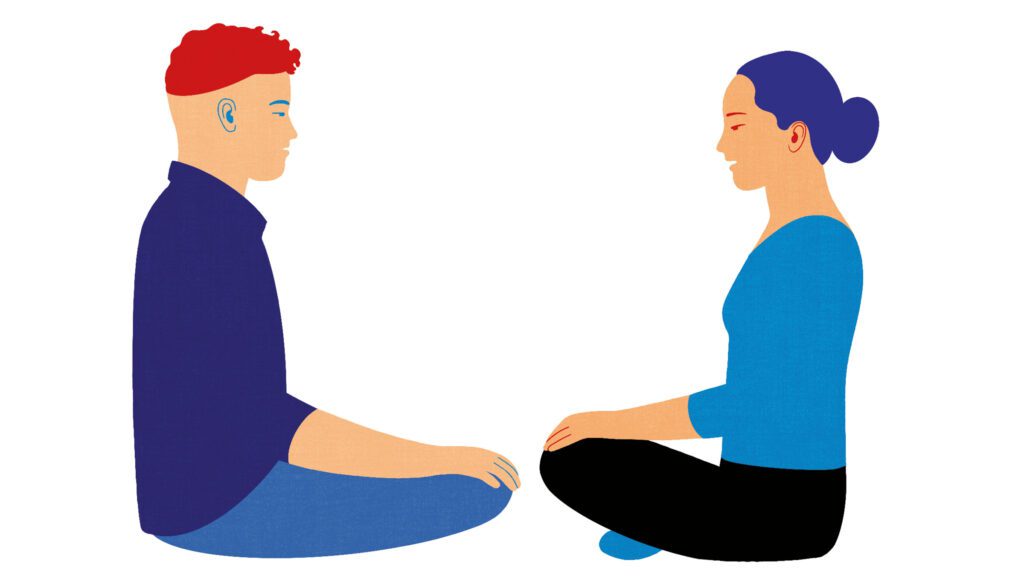One of my Zen students came to meet with me, furious at her partner. They couldn’t agree on anything, and it was getting worse. She was thinking of calling it quits, even though they’d been together for several years and had built a good life together. “He just doesn’t listen,” she told me, “and all he wants to do is offer solutions to my problems that never help.” She was hopeless about things ever getting better in their relationship.
I suggested that she try a practice taught to me many years ago by my own teacher: “When you are together, in the midst of an argument, ask yourself, ‘What’s here in this moment that I have never noticed about him before?’” She looked at me skeptically, and I feared that I was just one more person offering her another unhelpful solution. But at our next meeting, she was in tears. “We were having one of our usual fights, and instead of turning away I looked deeply into his eyes,” she told me. “I saw how scared he looked. I asked him about it, and he said that when we argued he was terrified of losing me, because he didn’t know how he’d manage without me. My anger melted away, and all the love I feel for him came flooding back.”
“True listening is perhaps the most profound act of love. It goes beyond merely hearing words — it’s about receiving your partner’s entire being.”
Intimate relationships offer us one of life’s most profound spiritual practices. Far beyond the romantic ideals portrayed in movies or novels, true intimacy is hard work; it requires a deep commitment to presence, awareness, and compassionate understanding. Mindfulness—the art of paying attention to the present moment without judgment—emerges as a transformative approach to nurturing love that’s both healing and expansive.
At its core, mindfulness in relationships is about radical presence. It’s about opening ourselves up to being surprised, setting aside our narratives, expectations, and reactive patterns to truly see and hear our partner as they are, not as we wish them to be. This begins with a fundamental shift in perception—from judgment to curiosity, from defensiveness to openness. This person I think I know so well, who are they in this moment?
Human connection thrives in presence. As Zen teacher John Tarrant says, “Attention is the most basic form of love.” Yet, how often do we find ourselves distracted, caught up in our own thoughts, or reacting reflexively to our partner without truly listening? Research shows that nearly half the time, our minds are elsewhere, thinking about something other than what we’re doing. This mental wandering not only diminishes our happiness, but also erodes the quality of our interactions. Mindfulness invites us to bring our attention back—to our partner, to the conversation, to the moment we’re sharing.
Mindfulness is especially useful in helping us appreciate the small moments. In long-term relationships, it’s easy to take our partner for granted, to let the daily routines and responsibilities overshadow the joy of simply being together. But when we bring mindful attention to these moments—sharing a meal, holding hands, laughing at a joke—we rediscover the richness of our connection. These small acts of presence make proverbial deposits in the relationship’s bank account, replenishing the trust and intimacy that sustain us through the inevitable challenges.
As we practice mindfulness in our relationships, we begin to recognize patterns in our own behavior. Perhaps we notice that we tend to shut down during conflict, or that we frequently seek validation from our partner. These realizations, though uncomfortable, are invaluable opportunities for growth. Through mindfulness, we can begin to heal old wounds and find alternatives to unhealthy patterns, ultimately becoming more loving, present, and supportive partners.
Mindfulness is particularly helpful when navigating moments of conflict. When we feel triggered—whether by something our partner says or does, or by our own insecurities—we often react from a place of fear or past conditioning. We may lash out, shut down, or become defensive, all of which distance us from our partner.
A mindful approach encourages us to pause before reacting. Instead of immediately responding from a place of emotional reactivity, we can take a moment to breathe, acknowledge our feelings, and choose how to respond with intention. This pause allows us to recognize our triggers and move beyond automatic reactions, creating space for more thoughtful, compassionate responses.
When we are truly present with our partner, we begin to understand them on a deeper level. We see their struggles, joys, and vulnerabilities not as sources of frustration or annoyance, but as an invitation to connect more fully.
Mindfulness allows us to pause and hold space for our partner’s emotions, even when they’re difficult to witness. It helps us develop patience and kindness, especially when we feel misunderstood or hurt. Rather than seeing our partner as an adversary, mindfulness allows us to be in that place of not knowing, not jumping to well-worn conclusions. We begin to ask ourselves: What might they be feeling? What are they trying to communicate, even if it’s not in words?
This shift in perspective can completely transform the way we relate to one another. It fosters a sense of compassion that moves beyond judgment and criticism, allowing for a greater sense of mutual respect and care.
Practical Approaches to Mindful Relationship Practice

1. Conscious Listening
True listening is perhaps the most profound act of love. It goes beyond merely hearing words—it’s about receiving your partner’s entire being. This means:
- Give your full attention without preparing your response.
- Listen with your whole body, not just your ears. Ask yourself, “What do I feel in my body as I listen?”
- Suspend judgment and personal interpretations.
- Allow space for your partner’s experience to be exactly as it is—not making it wrong, and not trying to fix it.
Practice sitting facing each other, maintaining soft eye contact, and taking turns speaking and listening. The speaker shares openly, while the listener remains fully present, breathing slowly and receiving without interruption.
2. Emotional Awareness and Regulation
Mindfulness teaches us to recognize our emotional states without being consumed by them. In relationships, this entails:
- developing the capacity to pause before reacting
- acknowledging your emotions without letting them dictate your behavior
- understanding what needs and fears are behind your emotional responses
- communicating feelings with clarity and compassion
When triggered, practice a simple breathing meditation. Take three deep breaths, feel your feet on the ground, and create a moment of spaciousness between stimulus and response.

3. Nonattachment and Accepting Change
Mindfulness reveals the impermanent nature of all experiences, including relationships. This doesn’t mean that we should love less, but rather that we might consider loving more openly and spaciously. Love flourishes when we release our grip of control.
Recognize that neither you nor your partner is a fixed entity. You are both dynamic, evolving beings. Embrace change as an integral part of love, not something to be feared. This perspective allows for genuine growth and mutual support.
4. Meditation as Relational Practice
Consider developing a shared meditation practice with your partner. This doesn’t require hours of silent sitting—even five minutes of synchronized breathing or guided meditation can create profound intimacy. Such practices help align your energies, develop mutual understanding, and create a container of mutual respect and love.
5. Overcoming Challenges with Mindful Awareness
No relationship is without challenges. Mindfulness doesn’t promise a perfect partnership but offers tools to navigate difficulties with grace. You learn to:
- recognize patterns of reactivity
- take responsibility for your own emotional landscape
- communicate vulnerably and honestly
- maintain compassion for yourself and your partner
In the midst of a conflict, take a moment to return to the breath. Remember that you’re on the same team, working together to understand and support each other.
As we cultivate mindfulness in our intimate relationships, the benefits extend far beyond our personal connection. We become more understanding, compassionate individuals who can show up more fully in all areas of life. Our love becomes a healing force, not just for ourselves and our partner, but for our wider community.
Mindful love is not about perfection but about presence. It’s a continuous practice of opening, listening, and loving with an ever-expanding heart. In a world often characterized by disconnection, each mindful relationship becomes a radical act of healing and transformation.

